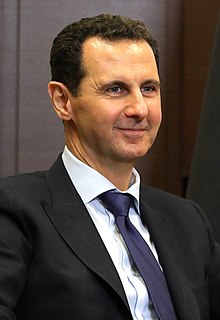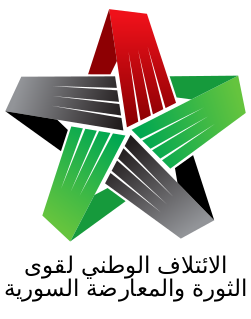
Bashar Hafez al-Assad is a Syrian politician who has been the President of Syria since 17 July 2000. He is also commander-in-chief of the Syrian Armed Forces and Regional Secretary of the Arab Socialist Ba'ath Party's branch in Syria. He is a son of Hafez al-Assad, who was President of Syria from 1971 to 2000.

The Syrian Civil War is an ongoing multi-sided armed conflict in Syria fought between the Ba'athist Syrian Arab Republic led by President Bashar al-Assad, along with domestic and foreign allies, and various domestic and foreign forces opposing both the Syrian government and each other in varying combinations.
Yassin al-Haj Saleh is a Syrian writer and political dissident. He writes on political, social and cultural subjects relating to Syria and the Arab world.

The Free Syrian Army is a loose faction in the Syrian Civil War founded on 29 July 2011 by officers of the Syrian Armed Forces who said their goal was to bring down the government of Bashar al-Assad. A formal organization at its founding, its structure gradually dissipated by late 2012, and the FSA identity has since been used by various opposition groups.

The Syrian National Council, sometimes known as the Syrian National Transitional Council or the National Council of Syria, is a Syrian opposition coalition, based in Istanbul, Turkey, formed in August 2011 during the Syrian civil uprising against the government of Bashar al-Assad.

Burhan Ghalioun, is a French Syrian professor of sociology at the Université de Paris III Sorbonne University in Paris, and the first chairman of the Syrian opposition Transitional National Council (SNC). He was named chairman on 29 August 2011. His chairmanship was criticized for his perceived closeness to the Muslim Brotherhood, his early reluctance to arm opposition forces, and what opponents called the autocratic nature of his leadership. On 17 May 2012, feeling he had become an increasingly divisive figure for the council, Ghalioun resigned.
Riad Mousa al-Asaad was the commander of the Free Syrian Army. He was a former Colonel in the Syrian Air Force who defected in July 2011.

The Siege of Homs was a military confrontation between the Syrian military and the Syrian opposition in the city of Homs as a part of the Syrian Civil War. The siege lasted three years from May 2011 to May 2014, and resulted in an opposition withdrawal from the city.

The Syrian opposition is an umbrella term for the political structure represented by the Syrian National Coalition and associated anti-government Syrian groups with certain territorial control in the form of a proto-state as an alternative Syrian government, claiming to be the legitimate Syrian Arab Republic and also sometimes known just as the Republic of Syria. The Syrian opposition evolved since the beginning of the Syrian conflict from groups calling for the overthrow of the Assad government in Syria and who have opposed its Ba'athist government. Prior to the Syrian Civil War, the term "opposition" had been used to refer to traditional political actors, for example the National Coordination Committee for Democratic Change; that is, groups and individuals who have had a history of dissidence against the Syrian state.
On 6 January 2012, a bomb exploded in the Al-Midan district of Damascus, Syria. According to the Syrian government, a suicide bomber attacked buses carrying riot police shortly before an anti-government protest was to begin. It said that 26 people were killed and over 60 were injured. Most of the victims were civilians, though the Syrian government showed footage of what it claimed to be the funeral of 11 police officers killed in the attack.

The Syrian peace process is the ensemble of initiatives and plans to resolve the Syrian Civil War, which has been ongoing in Syria since 2011 and has spilled beyond its borders. The peace process has been moderated by the Arab League, the UN Special Envoy on Syria, Russia and Western powers. The negotiating parties to end the conflict are typically representatives of the Syrian Ba'athist government and Syrian opposition, while the Western-backed Kurdish forces have stayed out of the negotiations framework. Radical Salafist forces and the Islamic State of Iraq and the Levant have not engaged in any contacts on peaceful resolution to the conflict.

The Syrian Civil War is an intensely sectarian conflict. The focus of the conflict has been identified by some as a ruling minority Alawite government and allied Shi'a governments such as Iran, pitted against the country's Sunni Muslim majority who are aligned with the Syrian opposition and their Sunni Turkish and Persian Gulf state backers. However Sunni Muslims make up the majority of the Syrian Arab Army and many hold high governmental positions. Others identify it as the secular Syrian government, made up of all religious groups pitted against the Islamist opposition. The conflict had drawn in other ethno-religious minorities, including Armenians, Assyrians, Druze, Palestinians, Kurds, Yazidi, Mhallami, Arab Christians, Mandaeans, Turkmens and Greeks.

The Group of Friends of the Syrian People is an international diplomatic collective of countries and bodies convening periodically on the topic of Syria outside the U.N. Security Council. The collective was created in response to a Russian and Chinese veto on a Security Council resolution condemning Syria.

Al-Nusra Front or Jabhat al-Nusra, known as Jabhat Fatah al-Sham after July 2016, and also described as al-Qaeda in Syria or al-Qaeda in the Levant, was a Salafist jihadist organization fighting against Syrian government forces in the Syrian Civil War. Its aim was to establish an Islamic state in the country.
Abdulbaset Sieda is a Kurdish-Syrian academic and politician. He is the former President of the Syrian National Council (SNC), succeeding Burhan Ghalioun in June 2012. He has written a number of books on the Kurds in Syria and his academic work specializes in ancient civilizations.

Human rights violations during the Syrian civil war have been numerous and serious, with United Nations reports stating that the war has been "characterized by a complete lack of adherence to the norms of international law" by the warring parties who have "caused civilians immeasurable suffering".

The Darayya massacre was a reported massacre that happenened between 20 and 25 August 2012 in the town of Darayya in the Rif Dimashq province of Syria, during the Syrian civil war.

The National Coalition for Syrian Revolution and Opposition Forces, commonly named the Syrian National Coalition (SNC), is a coalition of opposition groups in the Syrian Civil War that was founded in Doha, Qatar, in November 2012. Former imam of the Umayyad Mosque in Damascus, Moaz al-Khatib, considered a moderate, was elected the president of the coalition, and resigned on 21 April 2013. Riad Seif and Suheir Atassi, both prominent democracy activists and the latter a secular human rights advocate, were elected vice presidents. The post of a third vice president will remain vacant for a Kurdish figure to be elected. Mustafa Sabbagh was elected as the coalition's secretary-general. The coalition has a council of 114 seats, though not all of them are filled.













